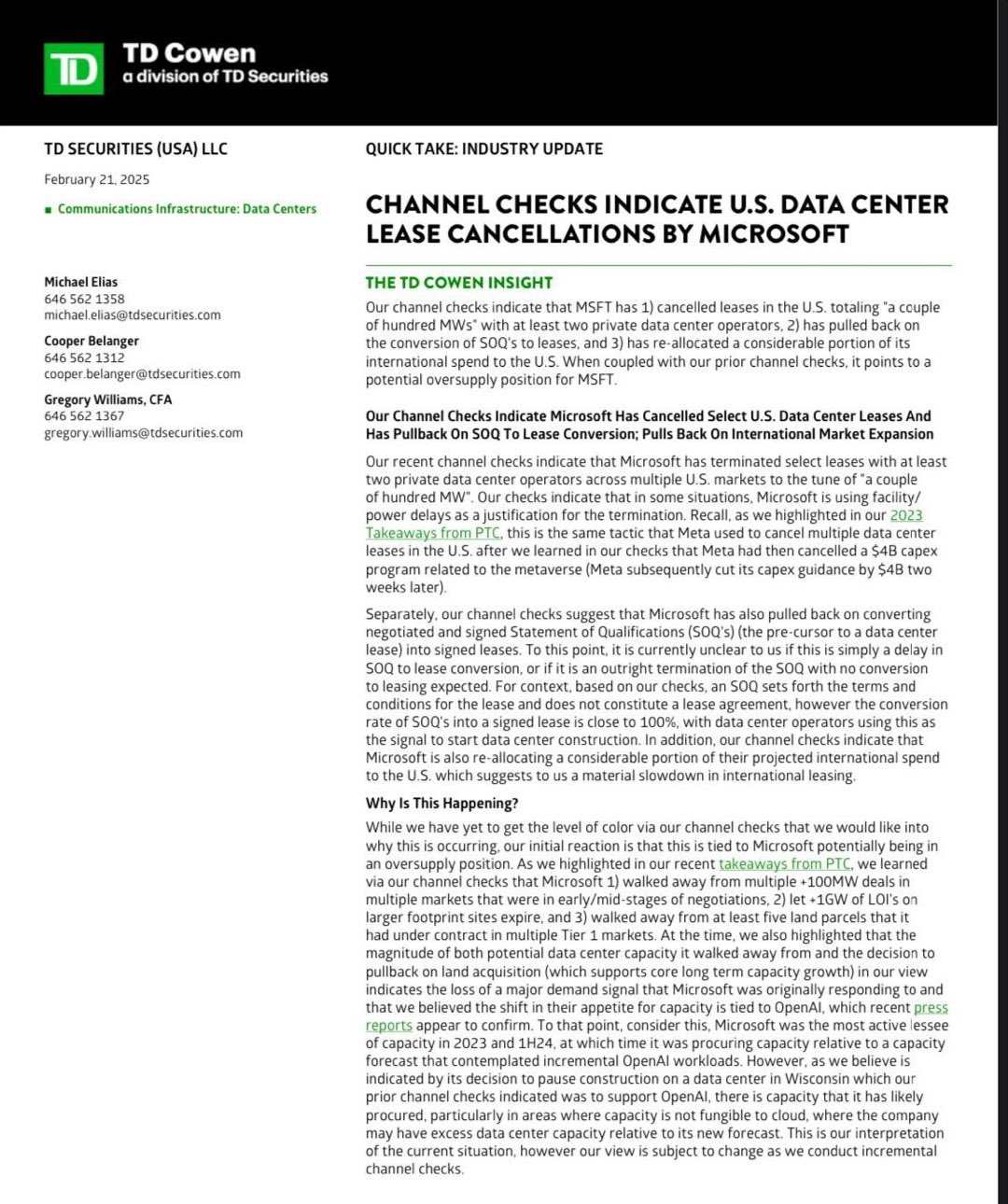Microsoft cancels AI data center leases linked to OpenAI—Is the AI hype cooling down?

Microsoft is pulling back on data center expansion, signaling a potential shift in the AI race. According to a report from TD Cowen analysts, the company has canceled leases for hundreds of megawatts of data center capacity in the U.S. and scaled back international spending. The move raises questions about whether AI’s explosive growth is starting to hit a reality check.
The canceled leases involve at least two private data center operators, with some deals exceeding 100 megawatts. Microsoft also let agreements for over a gigawatt of capacity expire and abandoned plans for additional land acquisitions. TD Cowen’s channel checks suggest the cancellations are potentially linked to OpenAI, indicating an ‘oversupply.’
“Microsoft Corporation (NASDAQ:MSFT) has cancelled data center leases with at least two operators in the U.S. and that the company had also scaled back plans for international spending,” Investing.com reported, citing analysts at TD Cowen.
In its report, TD Cowen said, “Our recent channel checks indicate that Microsoft has terminated select leases with at least two private data center operators across multiple U.S. markets to the tune of “a couple of hundred MW”. Our checks indicate that in some situations, Microsoft is using facility/power delays as a justification for the termination”
Microsoft Rethinks AI Infrastructure Investments
In January, Microsoft CEO Satya Nadella reaffirmed the company’s commitment to expanding its AI infrastructure, telling analysts it would continue investing in data centers while working to improve cost efficiency.
But that expansion may be losing momentum. Analysts at TD Cowen suggest the shift in Microsoft’s data center investments could be tied to OpenAI, which appears to be strengthening ties with Japan’s SoftBank Group as a key financial backer.
OpenAI and SoftBank recently announced Project Stargate, a $500 billion initiative to build AI data centers across the U.S.—a venture in which Microsoft is also involved.
Despite being OpenAI’s largest investor since 2019, Microsoft’s deep integration of OpenAI’s models into its software has yet to translate into widespread consumer success. Now, with OpenAI broadening its funding sources, Microsoft’s once-unquestioned role in AI infrastructure could be shifting.
Microsoft had previously committed $80 billion to AI data centers for fiscal 2025. But concerns over costs and efficiency are prompting a reassessment. Some canceled leases were reportedly justified using facility and power delays—similar to how Meta pulled back on its metaverse-related data center projects.
Is The AI Hype Cooling Down?
Tech giants have been pouring billions into AI infrastructure, betting that demand for advanced models will keep growing. But signs of restraint are emerging. OpenAI’s recent partnership with SoftBank and the introduction of low-cost AI models—such as DeepSeek’s—are prompting companies to reassess whether heavy investment in AI infrastructure is necessary.
TD Cowen’s report highlights how Microsoft has pulled back on turning signed statements of qualifications (SOQs) into full-fledged leases. SOQs typically signal near-certain commitments to build, so this slowdown suggests a rethink at the highest levels.
Impact on Azure and the AI Arms Race
Microsoft’s Azure cloud platform has been a major driver of AI adoption, but this shift could signal a cooling period. Bernstein analysts believe these canceled contracts could indicate a more sustained slowdown in Azure’s growth.
Bernstein analysts noted on Sunday that the uncertainty around Microsoft’s canceled data center contracts could signal a broader slowdown for Azure, its cloud computing division. Microsoft had projected Azure growth of 31% to 32% in the fiscal third quarter—figures that fell short of analyst expectations.
Microsoft has been OpenAI’s biggest backer since 2019, integrating its models across products like Bing and Office. But as new AI players enter the field and infrastructure costs balloon, the company may be looking for a more measured approach.
Whether this is a short-term adjustment or a longer-term trend remains to be seen. But one thing is clear—AI’s gold rush isn’t without its speed bumps.

Here’s a partial transcript of TD Cowen’s report:
TD SECURITIES (USA) LLC
QUICK TAKE: INDUSTRY UPDATE
February 21, 2025
Communications Infrastructure: Data Centers
CHANNEL CHECKS INDICATE U.S. DATA CENTER LEASE CANCELLATIONS BY MICROSOFT
THE TD COWEN INSIGHT
Our channel checks indicate that MSFT has:
- Cancelled leases in the U.S. totaling “a couple of hundred MWs” with at least two private data center operators,
- Pulled back on the conversion of SOQ’s to leases, and
- Re-allocated a considerable portion of its international spend to the U.S.
When coupled with our prior channel checks, it points to a potential oversupply position for MSFT.
Our Channel Checks Indicate Microsoft Has Cancelled Select U.S. Data Center Leases And Has Pullback On SOQ To Lease Conversion; Pulls Back On International Market Expansion
Our recent channel checks indicate that Microsoft has terminated select leases with at least two private data center operators across multiple U.S. markets to the tune of “a couple of hundred MW”. Our checks indicate that in some situations, Microsoft is using facility/power delays as a justification for the termination.
Recall, as we highlighted in our 2023 Takeaways from PTC, this is the same tactic that Meta used to cancel multiple data center leases in the U.S. after we learned in our checks that Meta had then cancelled a $4B capex program related to the metaverse (Meta subsequently cut its capex guidance by $4B two weeks later).
Separately, our channel checks suggest that Microsoft has also pulled back on converting negotiated and signed Statement of Qualifications (SOQs) (the precursor to a data center lease) into signed leases.
At this point, it is currently unclear to us if this is simply a delay in SOQ to lease conversion, or if it is an outright termination of the SOQ with no conversion to leasing expected.
For context, based on our checks, an SOQ sets forth the terms and conditions for the lease and does not constitute a lease agreement; however, the conversion rate of SOQs into a signed lease is close to 100%, with data center operators using this as the signal to start data center construction.
In addition, our channel checks indicate that Microsoft is also re-allocating a considerable portion of their projected international spend to the U.S., which suggests a material slowdown in international leasing.
Why Is This Happening?
While we have yet to get the level of detail via our channel checks that we would like into why this is occurring, our initial reaction is that this is tied to Microsoft potentially being in an oversupply position.
As we highlighted in our recent takeaways from PTC, we learned via our channel checks that Microsoft:
- Walked away from multiple +100MW deals in multiple markets that were in early/mid-stages of negotiations,
- Let +1GW of LOI’s on larger footprint sites expire, and
- Walked away from at least five land parcels that it had under contract in multiple Tier 1 markets.
At the time, we also highlighted that the magnitude of both potential data center capacity it walked away from and the decision to pull back on land acquisition (which supports core long-term capacity growth) in our view indicates the loss of a major demand signal that Microsoft was originally responding to.
We believed the shift in their appetite for capacity is tied to OpenAI, which recent press reports appear to confirm.
To that point, consider this:
- Microsoft was the most active lessee of capacity in 2023 and 1H24, at which time it was procuring capacity relative to a forecast that contemplated incremental OpenAI workloads.
- However, as we believe is indicated by its decision to pause construction on a data center in Wisconsin, which our prior channel checks indicated was to support OpenAI, there is capacity that it has likely procured.
- Particularly in areas where capacity is not fungible to cloud, the company may have excess data center capacity relative to its new forecast.
This is our interpretation of the current situation; however, our view is subject to change as we conduct incremental channel checks.




